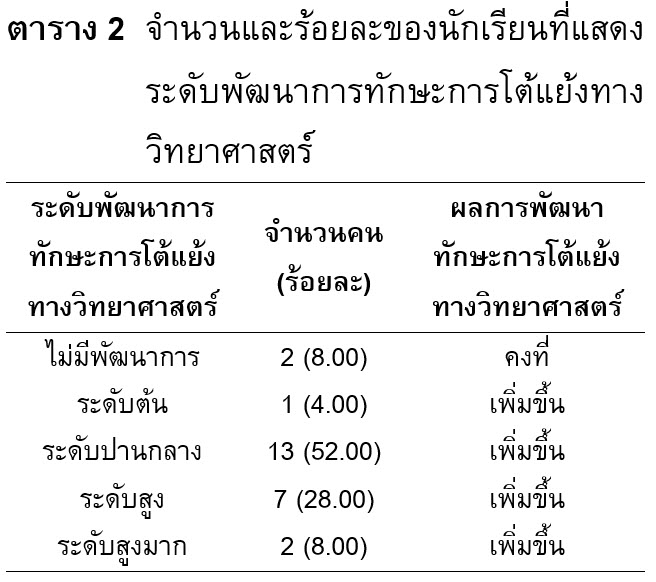การพัฒนาทักษะการโต้แย้งทางวิทยาศาสตร์ของนักเรียนชั้นมัธยมศึกษาปีที่ 4 ด้วยการจัดการเรียนรู้ตามแนวทางสะเต็มศึกษาด้วยวัฏจักรการเรียนรู้ 6 ขั้น เรื่อง ภารกิจพิทักษ์สิ่งแวดล้อม
Main Article Content
Abstract
Saharad Yokyong and Sasithep Pitiporntapin
รับบทความ: 16 มกราคม 2562; แก้ไขบทความ: 8 กันยายน 2562; ยอมรับตีพิมพ์: 15 กันยายน 2562
บทคัดย่อ
งานวิจัยนี้มีวัตถุประสงค์เพื่อพัฒนาทักษะการโต้แย้งทางวิทยาศาสตร์ของนักเรียนชั้นมัธยม- ศึกษาปีที่ 4 ด้วยการจัดการเรียนรู้ตามแนวทางสะเต็มศึกษาด้วยวัฏจักรการเรียนรู้ 6 ขั้น เรื่อง ภารกิจพิทักษ์สิ่งแวดล้อม กลุ่มที่ศึกษาในครั้งนี้ ได้แก่ นักเรียนชั้นมัธยมศึกษาปีที่ 4 แผนการเรียนศิลปะ–คณิตศาสตร์ ของโรงเรียนมัธยมศึกษาประเภทสหศึกษาในกรุงเทพมหานคร จำนวน 1 ห้องเรียน มีนักเรียนทั้งสิ้น 25 คน เครื่องมือที่ใช้ในการวิจัย ได้แก่ แบบวัดทักษะการโต้แย้งทางวิทยาศาสตร์ประกอบด้วย 4 องค์ประกอบ ได้แก่ การระบุข้อกล่าวอ้างและเหตุผลสนับสนุน การใช้หลักฐาน การให้ข้อโต้แย้งที่ต่างออกไป และ การให้เหตุผลสนับสนุนการโต้แย้งกลับ และแบบสัม-ภาษณ์นักเรียนอย่างไม่เป็นทางการ ผู้วิจัยวิเคราะห์ข้อมูลเชิงปริมาณ โดยหาค่าเฉลี่ย ความถี่ ร้อยละ และวิเคราะห์ข้อมูลเชิงคุณภาพ ผลการวิจัยพบว่า นักเรียนร้อยละ 92.00 มีพัฒนาการทักษะการโต้แย้งทางวิทยาศาสตร์ในระดับที่เพิ่มขึ้น ขณะที่นักเรียนร้อยละ 8.00 มีพัฒนาการทักษะการโต้แย้งทางวิทยาศาสตร์ในระดับคงที่ เมื่อพิจารณาแยกแต่ละองค์ประกอบของทักษะการโต้แย้งทางวิทยาศาสตร์ พบว่า องค์ประกอบที่นักเรียนมีพัฒนาการมากที่สุด คือ การให้เหตุผลสนับสนุนในการโต้แย้งกลับ และองค์ประกอบที่นักเรียนพัฒนาการน้อยที่สุด คือ การระบุข้อกล่าวอ้างและเหตุผล
คำสำคัญ: ทักษะการโต้แย้งทางวิทยาศาสตร์ สะเต็มศึกษา วัฏจักรการเรียนรู้ 6 ขั้น ภารกิจพิทักษ์สิ่งแวดล้อม
Abstract
The purpose of this research was to develop grade–10 students’ scientific argumentation skills through Science, Technology, Engineering, and Mathematics (STEM) Education by 6E learning cycle in Mission of Environmental Conservation. The participants were 25 grade–10 students of Art–Mathematics programme in a secondary school in Bangkok. The research instruments were the scientific argumentation skills test that consisted of 4 compo-nents which were claim and warrant, evidence, counter argument, supportive argument and informative interviews. The quantitative data were analyzed by means, frequencies and percentages, as well as the qualitative data were analyzed by content analysis. The findings showed that 92.00 percent of students had increased their scientific argumentation skills, and 8.00 percent of them had stable development of their skills. The researchers also found that the scientific argumentation skill components that students developed most were supportive argument, and the components that students developed least were claim and warrant.
Keywords: Scientific argumentation skills, STEM education, 6E learning cycle, Mission of environmental conservation
Downloads
Article Details

This work is licensed under a Creative Commons Attribution-NonCommercial 4.0 International License.
References
Burk, B. N. (2014). THE ITEEA 6E learning by DeSIGN™ model: Maximizing informed design and inquiry in the integrative STEM classroom. Technology and Engineering Teacher 73(6): 14–19.
Bybee, R. W. (1997). Achieving Scientific Literacy: From Purposes to Practices. Portsmouth, NH: Heinemann.
Cavlazoglu, B and Stuessy, C. (2018). Examining science teacher’s argumentation in a teacher workshop on earthquake engineering. Journal of Science Education and Technology 27(4): 348–361.
Duangpummes, W and Kaewura, W. (2017). Learning management in Thailand 4.0 with active learning. Humanities and Social Sciences Journal of Graduate School, Pibulsongkram Rajabhat University 11(2): 1–13. (in Thai)
Erduran, S., Simon, S., and Osborne, J. (2004). TAPping into argumentation: developments in the application of Toulmin’s argument pattern for studying science discourse. Science Education 88(1): 915–933.
Janhorm, C and Ketsing, J. (2018). Science, technology, engineering, and mathematics (STEM) education by 6E learning in topic of genetic disorder: Duchenne muscular dystrophy. IPST Magazine 46(212): 32–36. (in Thai)
Jimenez–Aleixandre, M., and Erduran, S. (2007). Argumentation in Science Education: Perspectives from Classroom–based Research. Dordrecht, the Netherlands: Springer.
Kanjanavasee, S. (2007). Evaluation Theory. 6th ed. Bangkok: Chulalongkorn University. (in Thai)
Lin, S. and Mintzes, J. J. (2010). Learning argumentation skills through instruction in socioscientific issues: The effect of ability level. International Journal of Science and Mathematics Education 8(6): 993–1017.
Ministry of Education. (2016). Education Development Plan of Ministry of Education (2017–2021). Retrieved from http://www.moe.go.th/moe/th/news/detail.php?NewsID=47194&Key=news, August 7, 2019. (in Thai)
National Research Council. (2012). A Frame work for K–12 Science Education: Practices, Crosscutting Concepts, and Core Ideas. Retrieved from http://www. nap.edu/catalog.php?record_id=13165, December 26, 2013.
Pharanat, W., and Nuangchalerm, A. (2018). Reasoned argumentation: A skill for surviving in the 21st century. Journal of Humanities and Social sciences Mahasarakham University 37(2): 174–181. (in Thai)
Pornsurat, P., Changsri, N. and Inprasitha, M. (2018). STEM education in mathematics education: Focusing on students’ argumentation in primary school. Engineering and Applied Science Research 45(4): 316–319. (in Thai)
Roongsangjun, T. (2018). Preparedness for the 4th renovation of Thai labor. Journal of Social Work 26(2): 172–204. (in Thai)
Sampson, V., and Blanchard, M. R. (2012). Science teachers and scientific argumen-tation: Trends in views and practice. Journal of Research in Science Teaching 49(9): 1122–1148.
The Institute for the Promotion of Teaching Science and Technology [IPST]. (2014). STEM education in 21st century learning. IPST Magazine 42(186): 3–5. (in Thai)
The Secretariat of the House of Representatives. (2016). Academic Paper: Thailand 4.0.Retrieved from http://library2.parliament.go.th/ejournal, December 12, 2016. (in Thai)
